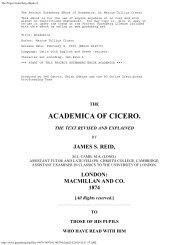From Farm House to the White House - 912 Freedom Library
From Farm House to the White House - 912 Freedom Library
From Farm House to the White House - 912 Freedom Library
You also want an ePaper? Increase the reach of your titles
YUMPU automatically turns print PDFs into web optimized ePapers that Google loves.
<strong>Farm</strong> <strong>House</strong> <strong>to</strong> <strong>the</strong> <strong>White</strong> <strong>House</strong>, by William M. Thayer 104<br />
In September Washing<strong>to</strong>n established his headquarters at Winchester, beyond <strong>the</strong> Blue Ridge, in <strong>the</strong> beautiful<br />
valley of <strong>the</strong> Shenandoah. It was a frontier <strong>to</strong>wn, one hundred and forty miles northwest of Richmond. He<br />
found <strong>the</strong> people of <strong>the</strong> <strong>to</strong>wn under great alarm in consequence of frequent reports of depredations by French<br />
and Indians. The <strong>to</strong>wn was crowded with men, women, and children, who had fled from <strong>the</strong>ir homes in <strong>the</strong><br />
wilderness <strong>to</strong> this place for protection, on hearing that <strong>the</strong> Indians were on <strong>the</strong> war-path. Many of <strong>the</strong>se reports<br />
were exaggerated, and o<strong>the</strong>rs had no foundation in truth. For instance, one morning <strong>the</strong> report came that a<br />
party of Indians was within twelve miles of <strong>the</strong> <strong>to</strong>wn, pillaging, burning and murdering in <strong>the</strong> most terrible<br />
manner. The report filled <strong>the</strong> inhabitants with consternation, and women and children were half crazed with<br />
fear.<br />
Washing<strong>to</strong>n ordered a company of soldiers <strong>to</strong> follow him in driving back <strong>the</strong> foe, but not one of <strong>the</strong>m would<br />
respond. Their fears were greater than <strong>the</strong>ir patriotism. Suspecting that <strong>the</strong> report might be exaggerated, he<br />
sent out scouts <strong>to</strong> learn something more definite. The scouts returned in one hour with <strong>the</strong> startling<br />
intelligence, "The Indians are less than four miles away, destroying everything in <strong>the</strong>ir track."<br />
On being questioned by Washing<strong>to</strong>n as <strong>to</strong> <strong>the</strong> facts in <strong>the</strong> case, <strong>the</strong> scouts said, "We heard <strong>the</strong>ir yells and guns<br />
distinctly, and <strong>the</strong>re is not a shadow of doubt but that <strong>the</strong>y will fall upon Winchester within an hour."<br />
Washing<strong>to</strong>n appealed <strong>to</strong> <strong>the</strong> soldiers again, and supplemented his appeal by authority and threats.<br />
About forty volunteered <strong>to</strong> accompany him <strong>to</strong> meet <strong>the</strong> savage foe. Moving with extreme caution and<br />
circumspection, <strong>the</strong>y reached <strong>the</strong> spot where <strong>the</strong> scouts heard <strong>the</strong> yells of Indian warriors. Sure enough, <strong>the</strong>y<br />
heard a kind of yell and <strong>the</strong> discharge of a musket, but nothing that indicated <strong>the</strong> presence of savages <strong>to</strong><br />
Washing<strong>to</strong>n's experienced ear. Pressing on a few rods far<strong>the</strong>r, a turn of <strong>the</strong> road disclosed <strong>to</strong> Washing<strong>to</strong>n two<br />
drunken soldiers, cursing, yelling and carousing, and occasionally firing off a pis<strong>to</strong>l in<strong>to</strong> <strong>the</strong> air. He made<br />
prisoners of <strong>the</strong> two worthless fellows, who had proved <strong>the</strong> scouts <strong>to</strong> be cowards, conveyed <strong>the</strong>m <strong>to</strong><br />
Winchester, and locked <strong>the</strong>m up.<br />
This incident shows that <strong>the</strong>re was little discipline among <strong>the</strong> soldiers, and little self-possession among <strong>the</strong><br />
people. In his discouragement, Washing<strong>to</strong>n wrote <strong>to</strong> Governor Dinwiddie:<br />
"In all things I meet with <strong>the</strong> greatest opposition. No orders are obeyed but such as a party of soldiers, or my<br />
own drawn sword, enforces. Without this, not a single horse, for <strong>the</strong> most earnest occasion, can be had, <strong>to</strong><br />
such a pitch has <strong>the</strong> insolence of <strong>the</strong>se people arrived by having every point hi<strong>the</strong>r<strong>to</strong> submitted <strong>to</strong> <strong>the</strong>m.<br />
However, I have given up none where his majesty's service requires <strong>the</strong> contrary, and when my proceedings<br />
are justified by my instructions; nor will I, unless <strong>the</strong>y execute what <strong>the</strong>y threaten, that is, 'blow out our<br />
brains.'... I would again hint <strong>the</strong> necessity of putting <strong>the</strong> militia under a better regulation, had I not mentioned<br />
it twice before and a third time may seem impertinent. But I must once more beg leave <strong>to</strong> declare that, unless<br />
<strong>the</strong> Assembly will pass an act <strong>to</strong> enforce military law in all its parts, I must decline <strong>the</strong> honor that has been so<br />
generously intended me. I see <strong>the</strong> growing insolence of <strong>the</strong> soldiers, and <strong>the</strong> indolence and inactivity of <strong>the</strong><br />
officers, who are all sensible how limited <strong>the</strong>ir punishments are, compared with what <strong>the</strong>y ought <strong>to</strong> be. In fine,<br />
I can plainly see that under <strong>the</strong> present establishment we shall become a nuisance, an unsupportable charge <strong>to</strong><br />
our country, and never answer any one expectation of <strong>the</strong> Assembly.... Why should it be expected from us,<br />
who are all young and inexperienced, <strong>to</strong> govern and keep up a proper spirit of discipline without laws, when<br />
<strong>the</strong> best and most experienced can scarcely do it with <strong>the</strong>m? If we consult our interest, I am sure it loudly calls<br />
for <strong>the</strong>m. I can confidently assert that recruiting, clothing, arming, maintaining, and subsisting soldiers who<br />
have since deserted have cost <strong>the</strong> country an immense sum, which might have been prevented were we under<br />
restraints that would terrify <strong>the</strong> soldiers from such practices."<br />
Ano<strong>the</strong>r trial which Washing<strong>to</strong>n experienced was <strong>the</strong> refusal of Captain Dagworthy, in command at Fort<br />
Cumberland, <strong>to</strong> obey his orders. Dagworthy had received his commission from <strong>the</strong> king, and he claimed that<br />
hence he was Washing<strong>to</strong>n's superior, who received his commission from a provincial governor. This affair















